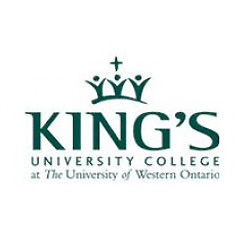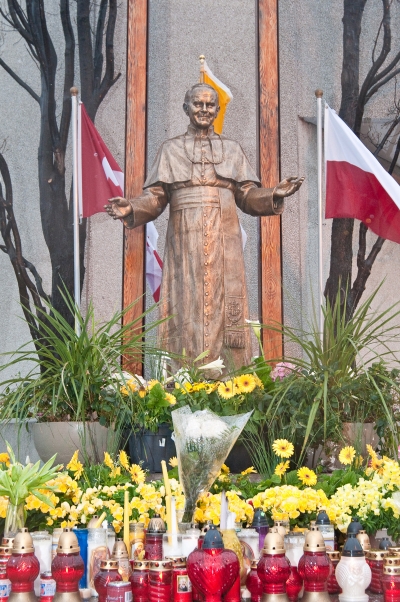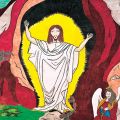TORONTO - It was a big day for Toronto's Poles, starting at 4.00a.m. when they gathered round their televisions to watch Pope Benedict XVI declare his predecessor blessed - one step removed from sainthood.
These photographs follow the Polish celebration in Mississauga and on Roncesvalles Avenue in downtown Toronto - two places where Poles live, work, shop and pray.
They witness the joy and pride Poles derive from the memory os Pope John Paul II.
View the images in the slideshow that is embedded below or click here to load a larger version in a new window.
You can use the small
Parents, students give wide-ranging opinion's on TCDSB equity policy
By Sheila Dabu Nonato, The Catholic Register TORONTO - Opinions varied, mostly along age lines, as the Toronto Catholic District School Board held the second consultation meeting on its proposed equity policy.
TORONTO - Opinions varied, mostly along age lines, as the Toronto Catholic District School Board held the second consultation meeting on its proposed equity policy.About 150 parents, students and teachers gathered April 27 at Our Lady of Lourdes Elementary School to discuss the policy. Two distinct sides became clear after 14 small groups broke off to discuss the policy which aims to combat discrimination based upon sexual orientation, race and religion in Toronto's Catholic schools. While parents and teachers were more concerned with ensuring the Catholic identity of schools, students among the group emphasized the need to prevent homophobic bullying by establishing gay-straight alliances (GSAs).
The TCDSB will make a report on the input from the two consultations as well as an online survey, said TCDSB spokesperson Emmy Szekeres-Milne. The report could come as early as May 19, she said.
During the three-hour meeting, participants broke off into smaller groups to discuss the policy, which the provincial government has mandated be in place by September. After 20 minutes, a representative from each group reported back to the larger group.
 Editor’s Note: The following Education Week essay by Msgr. Dennis Murphy is not intended as a comparison between the public and Catholic school systems but is only intended to underline the positive contribution that Catholic schools make to public life.
Editor’s Note: The following Education Week essay by Msgr. Dennis Murphy is not intended as a comparison between the public and Catholic school systems but is only intended to underline the positive contribution that Catholic schools make to public life.As we approach the October provincial election the question of public funding of the Roman Catholic school system in Ontario will predictably be raised again. Opponents of Catholic schools will offer familiar arguments: it is unfair that one religious denomination has its own publicly funded schools; these schools represent a divisive force in our pluralistic society; a single education system would be more effective, cost efficient and save the taxpayer money; and a secular society should not be in the business of funding anything that is religious.
Promoters of the Catholic system will respond that Catholic schools exist due to promises made as part of our Canadian Confederation and are therefore constitutionally guaranteed. While probably acknowledging that it is indeed unfair that Catholics are uniquely privileged, advocates of Catholic education will suggest the solution is not to abolish Catholic schools but to make publicly funded schools available to other parents. Proponents of Catholic education will point out there is no evidence that Catholic schools are a divisive force, as witnessed in the graduates not only from Catholic schools but from the religious schools that receive public funding in provinces such as British Columbia, Alberta and Manitoba. To the financial argument, the response will be that it is virtually impossible to prove that bigger education systems are more efficient and effective financially or educationally. Considering the cost of the much larger administrative units born through amalgamation of boards in the late 1990s, the argument that bigger is better rings hollow. To the contention that the province should not fund religious organizations and institutions, Catholic educators will point to Ontario’s long history of financially supporting not only their schools but religious hospitals, children’s aid societies and so on, all of which significantly contribute to public life. Finally they will cite data that belies any claim that ours is a secular society.
Jesus’ example inspires the next generation of Catholic leaders
By Sheila Dabu Nonato, The Catholic Register In the hallways of Ontario’s Catholic schools, the next generation of leaders is being formed.
In the hallways of Ontario’s Catholic schools, the next generation of leaders is being formed. What does it take to be a Catholic leader? Our Catholic faith invites us to look to Jesus’ example and His lessons of faith, humility, compassion and love for God and neighbour.
The hope of Catholic education is in our students who can provide this example of Christian leadership in their volunteer work and spiritual life.
Through Jesus’ words and actions, we learn about the Christian model of servant leadership: A leader who puts His love for God and others ahead of Himself and recognizes that it is through works of charity, compassion and love, which are rooted in faith, where God’s love is manifested.
For Catholic high school students, the challenge of being authentic Catholic witnesses becomes even greater as society becomes more secularized and popular culture presents viewpoints antithetical to Catholic values. An antidote to challenges that can weaken the faith and moral character of Catholic students, is having a solid grounding in spiritual and educational formation. Students need to have a solid foundation in their Catholic faith through an understanding of its rich history, traditions and teachings, with the support and mentorship of their parents and teachers.
 NIAGARA FALLS, Ont. - Being a Catholic student trustee has highlighted the gift of Catholic education for Olivia Suppa.
NIAGARA FALLS, Ont. - Being a Catholic student trustee has highlighted the gift of Catholic education for Olivia Suppa.“Catholic education brings so much diversity to our province,” said Suppa, president of the Catholic Board Council of the Ontario Student Trustees’ Association and a student trustee for almost two years. “You graduate embodying what Jesus wanted to embody.”
Suppa attends St. Jean de Brebeuf High School in Woodbridge, Ont., and took part in the recent Lighting the Way Catholic student leadership conference in Niagara Falls. Catholic schools, and being a trustee representing Catholic students, has taught her plenty.
“I learned a lot about myself, politics, (how much of an impact) a contagious idea, a contagious voice can be,” said the Grade 12 student.
Suppa said she was inspired by the Niagara Falls conference.
 TORONTO - It wasn’t an ordinary March Break trip for Maria Masucci and her sons, Christian and Michael.
TORONTO - It wasn’t an ordinary March Break trip for Maria Masucci and her sons, Christian and Michael.Masucci, a superintendent with the Dufferin Peel Catholic District School Board, took Christian, 11, and four-year-old Michael to the diocese of Jacmel in Haiti, where signs of the January 2010 earthquake are still all too obvious.
Masucci says the purpose of the trip was to breathe life into her kids’ lessons of faith by helping one’s neighbour.
Christian said he made new friends who taught him how to be grateful and “not to take simple things for granted.” In between soccer games, the St. Michaels’ Choir School student sang hymns for students at Le Bon Pasteur Elementary School.
Michael chimes in that he “wants to be a bishop in Haiti” when he grows up.
 NIAGARA FALLS, Ont. - In the joy and resilience of the street children of Calcutta, Natalie Rizzo found her faith deepened and her passion for helping others awakened.
NIAGARA FALLS, Ont. - In the joy and resilience of the street children of Calcutta, Natalie Rizzo found her faith deepened and her passion for helping others awakened.Rizzo, the student trustee for the Toronto Catholic District School Board and a student at Toronto’s Cardinal Carter Academy for the Arts High School, travelled to India last year with the Loretto Sisters as part of an outreach service trip. The program was offered through the TCDSB’s “Adventure Learning Experiences.”
“It was a humbling experience to connect and share educational opportunities with the street children,” she said of her time volunteering at Calcutta’s Loreto Day School Sealdah.
“My passion for social justice was very much heightened, (along with) the idea of responsible citizenship. When I got back from India, I wanted to run for student trustee and speak on behalf of the marginalized,” Rizzo, 18, told The Catholic Register at the recent Lighting the Way student conference in Niagara Falls.
The winner is... Twelve-year old Agustin Andres Villegas is undecided if he should be an artist or an archeologist when he grows up. Meantime, we sure do dig his drawing.
Villegas’ portrait of the Resurrection is the colourful image we selected to grace the cover of The Register’s 2011 Easter edition.
It was one of 370 entries submitted to the children’s Easter drawing contest conducted by The Register and Joseph’s Inspirational Inc.
 TORONTO - Ann Perron, the Toronto Catholic District School Board’s director of education, announced her retirement on April 14.
TORONTO - Ann Perron, the Toronto Catholic District School Board’s director of education, announced her retirement on April 14.During her tenure, Perron’s accomplishments have included the “implementation of a balanced and sustainable multi-year budget plan, a review of school board governance and the initiation of a three-year pastoral plan to ‘Nurture our Catholic Community Through Word, Worship and Witness,’ ” the TCDSB said in a statement.
Perron began her career as a teacher with the board in 1983. She taught in elementary and high schools and also worked as an elementary school principal. She has served as the provincial co-ordinator for the Institute for Catholic Education. From there, she became a superintendent with the Catholic District School Board of Eastern Ontario.
Perron also served as strategic advisor to the deputy minister of education in 2008. Perron returned to the Toronto board to take on the director of education role in March 2009.
The board is seeking a new director of education for September.
{iarelatednews articleid="5274,4397,5201"}
 TORONTO - The next generation of Canadian rabbis will be able to point to the Catholic roots of their training — or at least of their school. The Canadian Yeshiva and Rabbinical School will begin offering classes this fall in a classroom at the University of St. Michael’s College Faculty of Theology, part of the Toronto School of Theology.
TORONTO - The next generation of Canadian rabbis will be able to point to the Catholic roots of their training — or at least of their school. The Canadian Yeshiva and Rabbinical School will begin offering classes this fall in a classroom at the University of St. Michael’s College Faculty of Theology, part of the Toronto School of Theology.Canada’s future imams will have a similar story. A master’s program in Muslim studies is taking shape at the United Church of Canada’s seminary, Emmanuel College.
The Toronto School of Theology is reconsidering its mission statement so the consortium of seven Christian theological schools can accommodate the emerging interfaith reality.
The expansion beyond the boundaries of Christian faith is “the right move at the right time,” said TST director Alan Hayes.
More...
 SIAULIA, LITHUANIA - The Hill of Crosses in Lithuania is a unique travel destination, especially at Easter time.
SIAULIA, LITHUANIA - The Hill of Crosses in Lithuania is a unique travel destination, especially at Easter time.Three-and-a-half hours drive north from the capital Vilnus takes you to Siaulia. The pastoral scenery along the way is peacefully soothing. A little further turning left at a sign to Kryziu Kalnas, a country road will take you two kilometres to an unusual sight.
A hill, which in the past served as a military stronghold, is now a haven of peace. It strikes a musical chord of sad and happy sounds like a giant harp as the northeast wind blows. Thousands of small crosses rub the bases of big crosses, like plucking the strings of a harp. The sad sounds are a reminder of 1831-1863 when crosses were installed in memory of those who were exiled and murdered in Siberia for opposing Russia’s Tsarist rule. These sounds continued loudly during the time of the Soviet regime, 1917-1990.
During the Soviet era, the crosses served as symbols against atheism. At the same time they spoke strongly for the sentiments of Lithuanian nationalism.
 TORONTO - The Catholic Board Council of the Ontario Student Trustees’ Association has released a new social justice report urging Catholic students to become active in organizations promoting justice and service to marginalized groups.
TORONTO - The Catholic Board Council of the Ontario Student Trustees’ Association has released a new social justice report urging Catholic students to become active in organizations promoting justice and service to marginalized groups.“(The report) is trying to get the message across that social justice is such an integral way of making Catholic education come alive,” said Olivia Suppa, president of the Catholic Board Council.
“Let us live as Jesus wanted though nurturing the growth of Catholic leadership, and through opening our eyes and hearts to serve the victims of injustices in our communities, our country and our world,” according to the online report entitled “Social Justice: Inspiring Active Citizenship in Catholic Education.”
Members of the Catholic Board Council prepared the report over two years, with input from Catholic student trustees from across the province. The trustees call for an “active” component in the religion curriculum based “on our call to act as responsible stewards of humanity.” It also “encourages that local and global initiatives, outreach programs and positions related to social justice be included in religious education in the classroom, as well as integrated into the cultural life of the school community.”
 LONDON, Ont. - Sauro Camiletti has been appointed the new academic dean at King’s University College at the University of Western Ontario.
LONDON, Ont. - Sauro Camiletti has been appointed the new academic dean at King’s University College at the University of Western Ontario. Effective July 1, the appointment follows an intense international search and a broad consultative process within the King’s community.
“It is a great privilege to serve as a leader in an academic community that is recognized for the quality of its degree programs, the teaching ability and scholarship of its faculty, its Christian values and the services it provides its students,” said Camiletti.
 Human beings can’t choose to be political. We’re born that way. Politics is how we act together and human beings are fundamentally social.
Human beings can’t choose to be political. We’re born that way. Politics is how we act together and human beings are fundamentally social. “The political community and public authority are based on human nature,” said the Second Vatican Council in its Pastoral Constitution on the Church in the Modern World (Gaudium et Spes). “And therefore they need belong to an order established by God. Nevertheless, the choice of the political regime and the appointment of rulers are left to the free decision of the citizens.”
Those free decisions are supposed to bring us closer to justice, according to Pope Benedict XVI.
“Justice is both the aim and the intrinsic criterion of all politics,” the Pope wrote in the 2005 encyclical Deus Caritas Est. “Politics is more than a mere mechanism for defining the rules of public life. Its origin and its goal are found in justice.”



